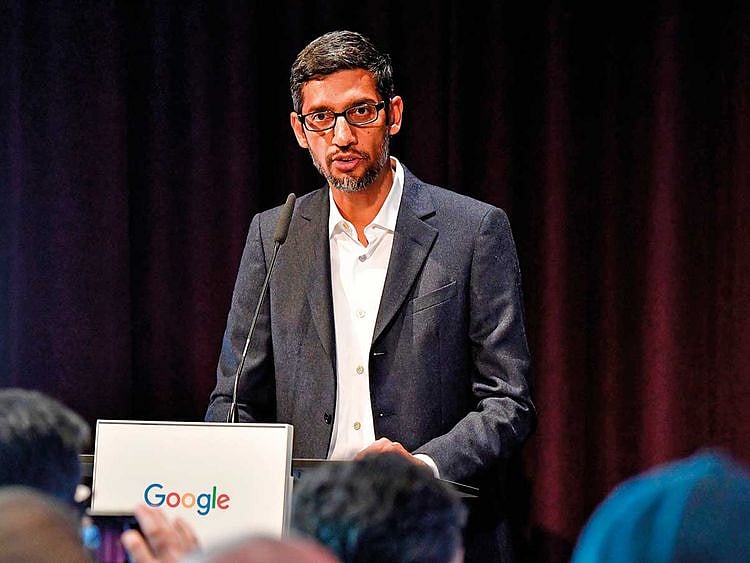Google’s parent company took an obvious step to replace its absentee chief executive officer. And while Alphabet Inc’s leadership change removes a cloud hanging over the company, it also creates potential new ones. Larry Page and Sergey Brin, the founders of Alphabet, wrote that Sundar Pichai will become the CEO of the corporate parent of Google in addition to the post as Google boss that he has held since 2015. This change was long overdue.
Page had grown increasingly invisible inside and outside the company, and he was no longer doing the job required of a powerful corporate chieftain in 2019. It’s not that his company necessarily suffered from Page’s reluctance or inability to fulfil his role.
Pichai has been running all the functional, important parts of the company such as web search, YouTube, cloud computing and more. Alphabet has done more than fine. But as long as Page was the Alphabet CEO, there was a problem of split authority — or a perception of it — between the figurehead boss and the functional one.
It no longer felt tenable for Page to do only the bits of the CEO job he liked and ignore everything else.
A clean break
That problem is gone. Brin will also step down from his role as president of Alphabet; both he and Page will remain on the board, and they will remain the ultimate authority through their control of the company’s voting stock. Answering the leadership question, however, raises a couple of fresh ones. The first is whether Pichai is up for the horrible, unpleasant task of being the official CEO of a big tech company. It’s an awkward question to ask, in part because no one can possibly be prepared for what has become an even more demanding and personally gruelling job as the tech industry becomes more muscular and less unquestionably admired.
Untested in the rough and tumble
Facebook’s Mark Zuckerberg has become extremely practised at apologising. Jeff Bezos, the CEO of Amazon, had his personal life splashed on the pages of tabloids.
Apple Inc’s Tim Cook is at the White House so often he should have a West Wing frequent visitor card. This is probably not what any of them imagined the job would be.
Pichai remains relatively untested at making decisions that will make him enemies no matter what he does — whether it’s dealing with demands from governments around the world or leading a workforce that is increasingly divided about policies and culture.
What Alphabet needs as much as a capable technologist is a charismatic champion and a good politician.
We’ll see how Pichai does in those roles, or if he perhaps leans on Google’s top lawyer or other more political- and policy-minded executives. That is what Page did in much of his time as Google’s CEO with Eric Schmidt as chairman. The second question is whether the Alphabet structure has outlived its usefulness. One original motivation for creating an umbrella structure over Google in 2015 was to give operational independence and a separate budget to nascent projects inside the company such as driverless cars, health-care initiatives and novel approaches to internet services.
Shooting for the Big Bang
The company’s shareholders back then were anxious that Google was pouring money into long-shot projects that might never pan out and diluting the earnings potential of Google’s cash-minting businesses. Creating the Alphabet structure let the company put all those projects into a money-draining box — the “here be dragons” portion of the company’s P&L — and spotlight the earnings power of Google’s mostly advertising-focused businesses.
The idea was that Page and Brin could focus on the big picture and leave the day-to-day stuff to Pichai and others.
But shielding Google from those “other bets” such as driverless cars no longer seems so urgent. Alphabet and other tech titans — particularly those effectively controlled by their founders — have a relatively long leash from investors to invest in both the projects that generate earnings now and on whatever comes next. Amazon, for example, spent $14 billion to buy a niche grocery store chain, and it’s investing in far-flung businesses such as health care and entertainment.
Amazon has always received a longer leash to tinker than most other companies, but I think Google’s cash firepower also lets it experiment without creating an artificial structure to shield Google from its less mature corporate cousins.
There may be a reason that Alphabet never became a blueprint for other technology companies that wanted to keep up with the times. They could keep up with the times, or not, without the blueprint. It is a credit to Page, Brin, Pichai and many others that Google has outlasted all predictions of its doom. It was a popular Silicon Valley parlour game a decade ago to say that Google would be rendered irrelevant by the smartphone age.
No one would need to search in the app age, the thinking went. Google would become the next in the long list of technology companies that couldn’t escape revolutionary technology changes. Google defied the odds and made that leap across the evolutionary gap. The next challenges for the company are technological, political and cultural. They’re just as existential as the last challenge of keeping up with an evolutionary technology shift. And now we’ll see if Pichai, and the structure Page left him, are up to the task.
Sign up for the Daily Briefing
Get the latest news and updates straight to your inbox
Network Links
GN StoreDownload our app
© Al Nisr Publishing LLC 2026. All rights reserved.
